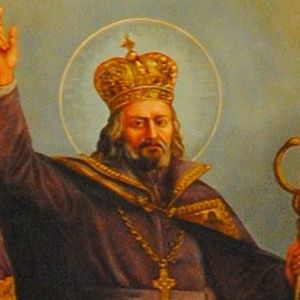St Josaphat, Bishop & Martyr – 12 November

St Josaphat was born in the Ukraine of Orthodox parents. In 1595 the Union of Brest brought the Ruthenian Church into communion with Catholic Rome while still preserving its own liturgy. The result was a schism within the church itself, with one party wanting to remain Orthodox and in the orbit of Moscow and Constantinople, while the other accepted the Union. Matters were complicated by the presence of the Greek Uniates, a remnant of a century-old attempt at church union (who remain a living church to this day).
Josaphat joined the first monastery of the order of St Basil to be united to the Catholic Church: he was the first person to do so. He was ordained priest and, eventually and reluctantly, appointed bishop of Polotsk in 1617. Although Sigismund III Vasa, King of Poland and Grand Duke of Lithuania, supported the union, the local aristocracy were against it because it threatened their control of ecclesiastical benefices. Plotting with the Orthodox Patriarch of Jerusalem, who visited the Ukraine in 1621, they stirred up trouble and as a result Josaphat was murdered by a mob in 1623 while on a pastoral visit to Vitebsk.
Pope Pius XI’s encyclical “Ecclesiam Dei”
He gave his life for the unity of the Church
In designing his Church God worked with such skill that in the fullness of time it would resemble a single great family embracing all men. It can be identified, as we know, by certain distinctive characteristics, notably its universality and unity.
Christ the Lord passed on to his apostles the task he had received from the Father: I have been given all authority in heaven and on earth. Go, therefore, and make disciples of all nations. He wanted the apostles as a body to be intimately bound together, first by the inner tie of the same faith and love which flows into our hearts through the Holy Spirit, and, second, by the external tie of authority exercised by one apostle over the others. For this he assigned the primacy to Peter, the source and visible basis of their unity for all time. So that the unity and agreement among them would endure, God wisely stamped them, one might say, with the mark of holiness and martyrdom.
Both these distinctions fell to Josaphat, archbishop of Polock of the Slavonic rite of the Eastern Church. He is rightly looked upon as the great glory and strength of the Eastern Rite Slavs. Few have brought them greater honour or contributed more to their spiritual welfare than Josaphat, their pastor and apostle, especially when he gave his life as a martyr for the unity of the Church. He felt, in fact, that God had inspired him to restore world-wide unity to the Church and he realised that his greatest chance of success lay in preserving the Slavonic rite and Saint Basil’s rule of monastic life within the one universal Church.
Concerned mainly with seeing his own people reunited to the See of Peter, he sought out every available argument which would foster and maintain Church unity. His best arguments were drawn from liturgical books, sanctioned by the Fathers of the Church, which were in common use among Eastern Christians, including the dissidents. Thus thoroughly prepared, he set out to restore the unity of the Church. A forceful man of fine sensibilities, he met with such success that his opponents dubbed him “the thief of souls.”
(universalis.com)
